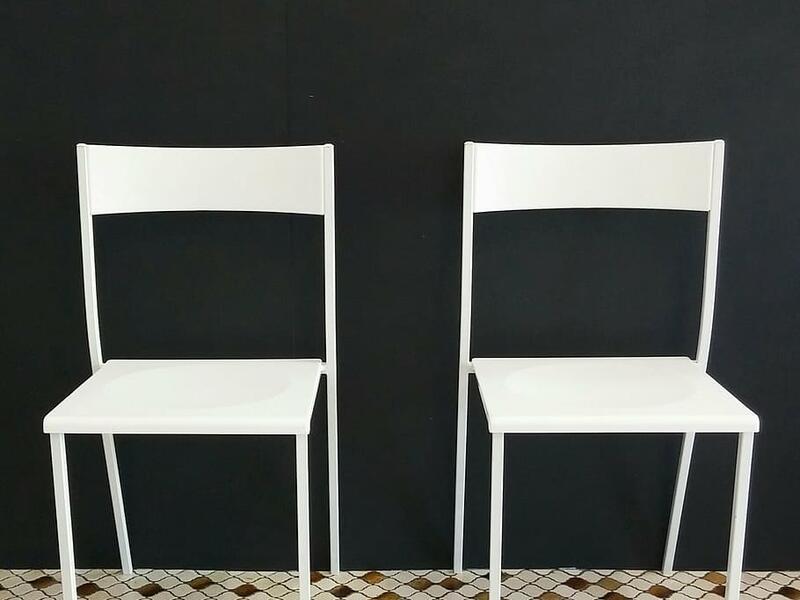A Seat at My Orthodox Jewish School’s Ma’ariv Service
I don't know why I walked into shul one Wednesday night when the boys were called in to daven Ma’ariv. Usually, I'd sit on the steps with the other girls, discussing the latest science project we’d completed in our after-school program while we waited for the male half of our carpool to finish talking to God. But that night, I decided to walk in.
The shul in my middle school had never been a particularly hospitable place. Prior to that Wednesday, I generally only saw it on Rosh Chodesh, when 150 girls would crowd into a too-small, sweaty space filled with jostling elbows and scolding teachers.
As you might imagine, davening in those conditions was never particularly spiritual for me; maybe I decided to walk in that Wednesday night because I just wanted a second shot at making a meaningful connection with Hashem. Whatever my reasoning, I’m sure my unprecedented visit to the shul did not have the intended effect.
There were no chairs in the women's section of the shul: only backpacks, filing cabinets, and a couple card tables. It looked like your house's junk drawer in the form of a room. I stood by the mechitza so I'd at least have a wall to lean on, and acted like I didn't see the dozen or so boys eyeing me strangely. I doubt they'd ever seen a girl voluntarily enter the synagogue. If I’d been able to look in a mirror, I'm sure my cheeks would have been burning scarlet. When Ma’ariv was over, I left quickly, vowing to myself that I'd never repeat that horrible experience.
Yet, the incident stayed with me throughout the week. I mentioned it to some of my friends, and after the next science club meeting, three other girls joined me in the synagogue. The week after that, there were fourteen of us; and we decided that we’d had enough of these subpar praying conditions.
I wrote an email to my principal explaining our predicament, and asked for chairs to be set up so we could pray in comfort. He responded positively, and the next week all fourteen of us raced eagerly into the shul. Surprise, surprise: there were no chairs to be found. Except, of course, on the other side of the mechitza.
We marched over and grabbed fourteen chairs from the men’s side. The boys looked horrified. Up until now, they’d mostly been pretending that they didn't notice us, and we had been doing our best to daven without really being seen. Now, however, we didn't have any other choice but to acknowledge each other. Some of them nodded and some of them turned their backs.
Heads held high, we carried our chairs to the front of the room. Silently, we plopped them down onto the cold floor, sat, and waited. After a pause, the rabbi motioned for prayers to begin. Once Ma’ariv was over, when the chairs were put away and we were filing out, I heard our assistant principal say to one of the teachers, “they'll give up on this soon.” I angrily recounted this moment to my friends, and it only furthered our resolve.
Over the course of the next week, we barraged the principal with reminders to have chairs set up. We sent email after email. Wednesday night, we all walked slowly into the shul and then saw: there were chairs! Filing cabinets had been pushed to the side to make room for three rows of seats. We all rushed to grab siddurim and sit down in the gray chairs. My prayers have never been better than they were that night.
Through this experience, I realized that Judaism isn't perfect. But if we work to change the things that bother us about it, the outcome can strengthen our relationship with God. And, as an added bonus, we can make sure all of the people who would be negatively affected by the same things we are won't be in the future. Food tastes better when you work for it, and so does Judaism. I think it sometimes takes living without something to fully appreciate it; because of that experience and others like it, I now appreciate my Judaism and my practice all the more.
Since that moment, I have used this ideology to take action and change the practices that bother me in my religious community. I have sent countless emails, spoken to various teachers and leaders, and gathered groups of Jewish teens with the same values to fight for equality. And when I accomplish a goal for the betterment of my community, I get that same rush I did when I walked into the women's section that Wednesday night.
This piece was republished on Fresh Ink for Teens.
This piece was written as part of JWA’s Rising Voices Fellowship.








This was so inspiring to read!! I love how you took action, finding the flaws in the religious system to ultimately make that system more fulfilling for all!! This line especially spoke to me: "Through this experience, I realized that Judaism isn't perfect. But if we work to change the things that bother us about it, the outcome can strengthen our relationship with God."
We don't have to ignore the imperfections of organized religion, but instead, find ways to own those and better them so that everyone can grow!! Great piece!
-Shoshie